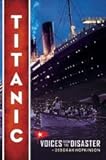Titanic: Voices from the Disaster by Deborah Hopkinson

Titanic: Voices from the Disaster
by Deborah Hopkinson
(Audio & paper)
Reading this book was a horrible but wonderful mistake. I don't know why I thought I could handle reading a book about the Titanic in the car. I know the story and it does not end well! Several times I had to pull over to cry or sit in my car composing myself after reading something particularly moving. I was filled with an intense amount of anxiety every time I even thought about getting into the car. Who was going to die? Not most of the people in this book, because it's actually a collection of quotes and other writings structured around the timeline of the titanic's voyage. But I was so, so emotionally invested and concerned about all of these people who are long, long dead. I had the same problem while watching the Titanic movie; watching the sinking killed me, not for the main fictional characters, but for everyone else--crew, third class passengers, etc.
I obviously knew how it was going to turn out, but I loved this way of telling the story, getting all the different pieces from firsthand accounts, couched in explanation I need to keep the timeline going.
I so was relieved when this was over. It felt good to get back into my car again. But then, three days later at the library, I saw a copy of this book in paper--that contained photos, diagrams, and scans of documents. I teared up in the middle of the library and immediately checked it out. So not only was it a mistake to read the book the first time, I took it out again to read it a second time in the span of the same week. I'm a glutton for punishment.
Here's what I learned while earreading/reading this book:
- I am still insanely and inexplicably in love with Marconi Men in general and Harold Bride in particular. I squeed like a fangirl every time Harold or Jack came up in the story, several times during which I had to pause the audio so I didn't miss anything.
- I didn't realize there were second and third class men who actually acted like honorable gentleman, helping the crew load women and children into lifeboats and actually pulling some men right out of lifeboats to make room for women and children.
- I didn't realize how much time and effort went into launching a life boat. You couldn't just toss it into the water and have people hop on board.
- There was a swimming pool, gym, and racketball courts on board the titanic
- Some passengers only booked passage from Southampton to France, and it's because of (future Father) Brown's religious order denying him passage to America that so many photos of the Titanic actually survived.
- Second Officer Lightoller was called "Lights" and had, like, a bazillion chances to save himself but took his chances with the last "boat" instead. I'm really excited to listen to his tale here: http://www.bbc.co.uk/archive/titanic/5047.shtml
- In fact, there were a lot of moments of people who didn't want to leave--both because they didn't realize the danger (at first) or because they were being noble or wanted to stay with family--some of those people actually lived, thanks to luck or quick-thinking or strength or all of the above.
- I'm a Collapsable B fangirl for life. I fangirl that Collapsable B boat almost as much as Marconi Men. Seriously, I love me some overturned, life-saving Collapsable B action.
- I knew the Titanic was off course but didn't realize she was actually closer to the Carpathia because of it. Still, rescue took too long to get to them.
- All the people on board the Carpathia who gave up their beds, clothes, blankets, etc. and even sewed clothes for the survivors as they journeyed to America.
- The funds set up to help survivors who lost everything.
I saw another Titanic account in the biographies section the other day at the library and almost picked it up, before I realized what I was doing. I can't handle more emotion just yet. But I hope to read Colonel Archibald Gracie's memoir/account some day. And I really am glad I went through the paper version of the book again, looking at all the photos and diagrams and things... even though it made me cry all over again. There was so much tragic loss of life--not even close to how man people die of disease or war in this world on any given day, but still this story pulls at me and amazes me and saddens me. It was an emotional experience, earreading this book. And I thought I was prepared for it. But hearing the accounts straight from the mouths and letters of the people involved was incredibly powerful. I loved the diversity of the people included (by no means a collection of everything ever, but a great sampling of men, women, classes, nationalities, crew, passengers, and others involved).
Reading this was a mistake I am glad to have made now that I'm done and on the other side of it. I really must try to never earread this sort of thing while driving, though.